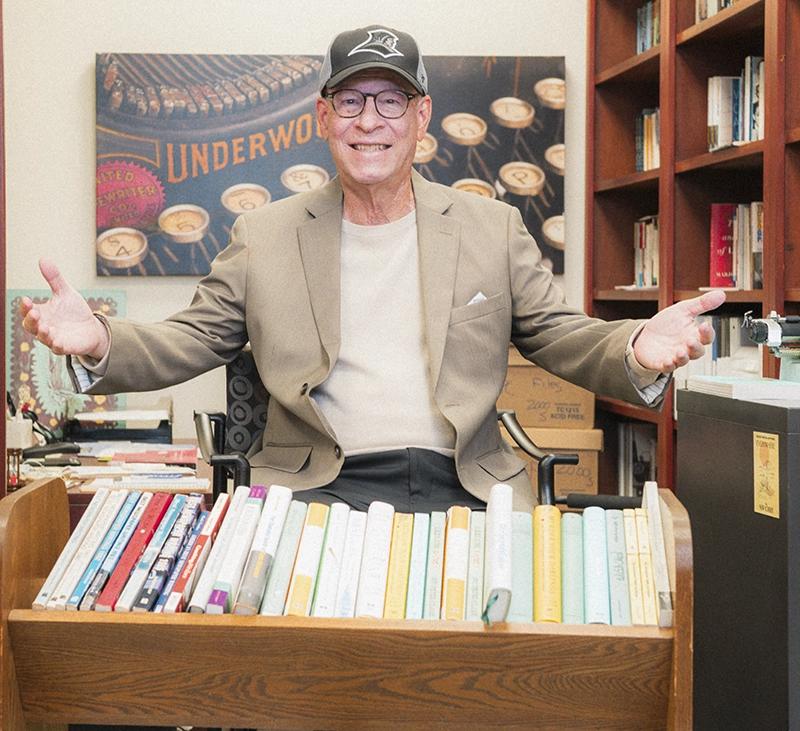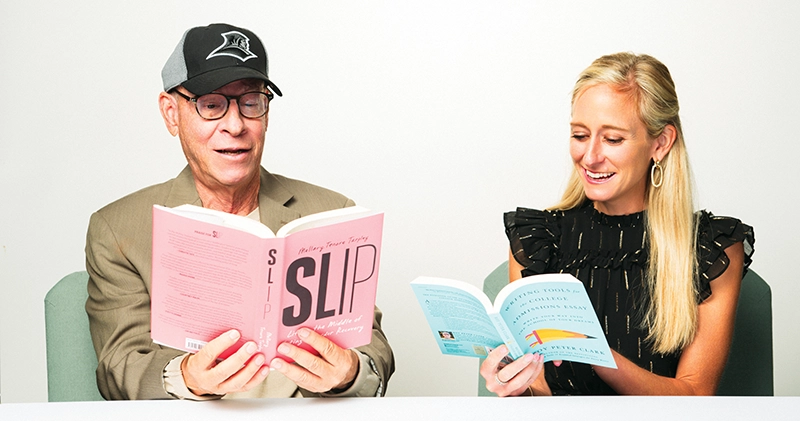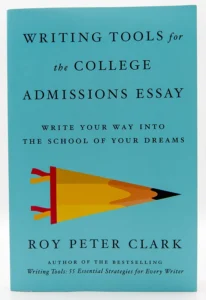Mallary Tenore Tarpley ’07 on the latest book by her mentor, Roy Peter Clark ’70
By Mallary Tenore Tarpley ’07
I first came across Roy Peter Clark’s work during my junior year at Providence College, while doing an online search of fellow Friars who worked in journalism. Wanting to become a journalist myself, I reached out to Roy to share my interest in the field and to see if he’d be willing to offer career advice. I didn’t know if I’d ever hear back, but I figured it was worth a try.
To my surprise, Roy responded right away. Soon after, we met at a writer’s conference and shared stories about our time at PC — including our experiences working for The Cowl student newspaper and all the hours we spent reading the same texts by Homer, Chaucer, and Shakespeare. During that meeting, I sensed that Roy would be a helpful resource, but I didn’t know he would become so much more: a one-of-a-kind mentor, a dear family friend, and the godfather of my first-born child.
Now, 20 years after that fateful meeting, Roy has just published his 21st book, Writing Tools for the College Admissions Essay, and I’ve just published my first book, SLIP, which explores my lived experience with anorexia nervosa alongside a social and medical history of eating disorders. Roy is 20 books ahead of me, and he graduated 37 years ahead of me — gaps that our shared interests have bridged. His success as an author, and the career he’s carved out for himself, have always inspired me to aspire for something similar. And as my mentor, he has shown me the way.

Not long after I first met Roy at the writer’s conference, he helped me get my first big break in journalism: a prestigious fellowship at the Poynter Institute for Media Studies in St. Petersburg, Florida, where he has spent most of his career. The fellowship turned into my first job, as a reporter and copy editor for Poynter’s website. During those early years in Florida, Roy and his wife, Karen, became my family away from home. They invited me to join them for local musical performances, book festivals, and dinners at Applebee’s. Every Sunday, the three of us met for Mass at St. Paul’s Catholic Church, where I maintained my faith as a recent college graduate.
Their familial support gave my father — who still lived in my childhood home in Massachusetts — peace of mind. He appreciated knowing that although I was far from home, I wasn’t alone. Over time, Roy got to know my father and would later be among the first to meet my boyfriend Troy, who I went on to marry. When Troy and I had our first child, we both knew we wanted Roy and Karen to be her godparents.
As my adult life unfolded, Roy took me out for weekly lunches at Pizza Hut. A basket of breadsticks between us, we’d talk about family and work, engaging in conversations that were both silly and serious, informal and instructive. At times, I’d find myself scribbling down Roy’s words of wisdom on table napkins. Among them: To become a better writer, you have to do three things: read, write, and talk about reading and writing. Together, we did all three.

Over the years, I committed his myriad writing tips to memory, including: build your work around a key question, recruit your own writing support group, capture concrete details that appeal to the senses, and limit criticism in early drafts. These tips have no doubt strengthened my writing, but they’ve also proven helpful in life — by teaching me to be inquisitive, seek out community, be more attuned to the world around me, and quiet my inner critic.
The latter lesson proved especially helpful after I published a story about how journalists could use Twitter (now X) as a reporting and storytelling tool. The story got a lot of positive attention, but it also drew criticism from a couple of readers who noticed that when describing the caret symbol (^), I incorrectly spelled it “carrot.”
As a young journalist, I felt mortified. I confided in Roy who, true to form, turned the mistake into a learning opportunity. With my permission, he wrote a story about how easy it is to misuse homonyms and how writers can avoid doing so. He then gifted me a decorative carrot as a comical reminder that mistakes happen. (Eighteen years later, I still have it in my desk drawer).
I think of that carrot whenever I make a mistake, or whenever I feel like my writing doesn’t measure up. That feeling arose a few years ago, after I got a string of rejections when trying to find a publisher for my memoir. “I don’t know if this book is ever going to see the light of day,” I said to Roy during what felt like a dark time. He told me it would, assuring me he believed in the book. When I eventually did get a book deal, from a Simon & Schuster imprint, Roy was one of the very first people I contacted.

Although Roy and I haven’t worked in the same place for well over a decade, we’ve continued to stay in close touch — not just as colleagues but as comrades. We’ve done what the best writers and friends do: lift each other up and help each other out.
I try lifting him up by introducing his work to the next generation of journalists at the University of Texas at Austin, where I’m now a journalism professor. I share Roy’s writing tips with students so often that anyone who has ever taken a class with me is sure to be familiar with his many books and teachings. Sometimes I also invite Roy to be a guest speaker so that students can get to know him better, just as I first got to know him when I was their same age.
During one of his recent class visits, Roy told my students that he was working on a new book about college admissions essays and was looking for examples to include. Eight of the students sent him their college essays, and Roy decided to include each one. When I told the students that their essays were going to be published, their reactions of surprise and delight reminded me of the way I felt when Roy responded to that fateful note I sent him all those years ago during my junior year.
I alluded to this in the acknowledgements section of my own book, where I thank Roy for always helping me to pursue my passion for writing. “You’ve taught me so much of what I know as a writer,” I wrote, “and your mentorship helped me get where I am today.”
For that, I will always be grateful.





